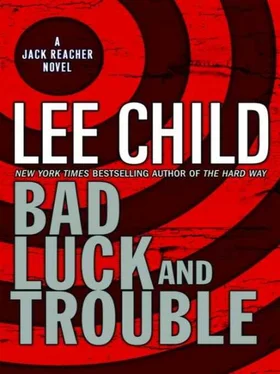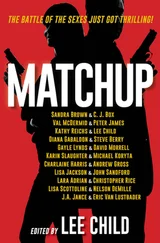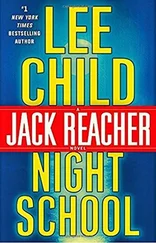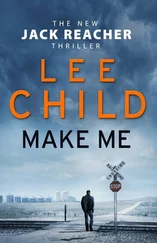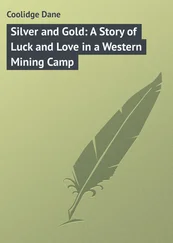Forty yards west, the man in the blue suit watched them go, too. He was slumped low in his blue Chrysler in a hairdresser’s lot on Wilshire. He dialed his boss and said, “There are three of them now. I think the new one must be O’Donnell. Therefore the bum is Reacher. They look like they’ve got the bit between their teeth.”
And three thousand miles away in New York City the dark-haired forty-year-old was in the shared airline offices at Park and 42nd. He was buying an open round-trip ticket from LaGuardia to Denver, Colorado. He was paying for it with a Visa Platinum card in the name of Alan Mason.
Santa Ana was way south and east, past Anaheim, down in Orange County. The township itself was twenty miles west of the Santa Ana Mountains, where the infamous winds came from. Time to time they blew in, dry, warm, steady, and they sent the whole of LA crazy. Reacher had seen their effects a couple of times. Once he had been in town after liaising with the jarheads at Camp Pendleton. Once he had been on a weekend pass from Fort Irwin. He had seen minor barroom brawls end up as multiple first-degree homicides. He had seen burnt toast end up in wife-beating and prison and divorce. He had seen a guy get bludgeoned to the ground for walking too slow on the sidewalk.
But the winds weren’t blowing that day. The air was hot and still and brown and heavy. O’Donnell’s rented GPS had a polite insistent female voice that took them off the 5 south of the zoo, opposite Tustin. Then it led them through the spacious grid of streets toward the Orange County Museum of Art. Before they got there it turned them left and right and left again and told them they were approaching their destination. Then it told them they had arrived.
Which they clearly had.
O’Donnell coasted to a stop next to a curbside mail box tricked out to look like a swan. The box was a standard USPS-approved metal item set on a post and painted bright white. Along the spine at the top was attached a vertical shape jigsawed from a wooden board. The shape had a long graceful neck and a scalloped back and a kicked-up tail. It was painted white too, except for the beak, which was dark orange, and the eye, which was black. With the bulk of the box suggesting the swell of the bird’s body it was a pretty good representation.
O’Donnell said, “Tell me Swan didn’t make that.”
“Nephew or niece,” Neagley said. “Probably a housewarming gift.”
“Which he had to use in case they visited.”
“I think it’s nice.”
Behind the box a cast concrete driveway led to a double gate in a four-foot fence. Parallel to the driveway was a narrower concrete walkway that led to a single gate. The fence was made of green plastic-coated wire. All four gateposts were topped with tiny alloy pineapples. Both gates were closed. Both had store-bought Beware of the Dog signs on them. The driveway led to an attached one-car garage. The walkway led to the front door of a small plain stucco bungalow painted a sun-baked tan. The windows had corrugated metal awnings over them, like eyebrows. The door had a similar thing, narrower, set high. As a whole the place was serious, severe, adequate, unfrivolous. Masculine.
And quiet, and still.
“Feels empty,” Neagley said. “Like there’s nobody home.”
Reacher nodded. The front yard was grass only. No plantings. No flowers. No shrubs. The grass looked dry and slightly long, like a meticulous owner had stopped watering it and mowing it about three weeks ago.
There was no visible alarm system.
“Let’s check it out,” Reacher said.
They got out of the car and walked to the single gate. It wasn’t locked or chained. They walked to the door. Reacher pushed the bell. Waited. No response. There was a slab path around the perimeter of the building. They followed it counterclockwise. There was a personnel door in the side of the garage. It was locked. There was a kitchen door in the back wall of the house. It was locked, too. The top half of it was a single glass panel. Through it was visible a small kitchen, old-fashioned, unrenovated in maybe forty years, but clean and efficient. No mess. No dirty dishes. Appliances in speckled green enamel. A small table and two chairs. Empty dog bowls neatly side by side on a green linoleum floor.
Beyond the kitchen door was a slider with a step down to a small concrete patio. The patio was empty. The slider was locked. Behind it, drapes were partially drawn. A bedroom, maybe used as a den.
The neighborhood was quiet. The house was still and silent, except for a tiny subliminal hum that raised the hairs on Reacher’s arms and sounded a faint alarm in the back of his mind.
“Kitchen door?” O’Donnell asked.
Reacher nodded. O’Donnell put his hand in his pocket and came out with his brass knuckles. Ceramic knuckles, technically. But they didn’t have much in common with cups and saucers. They were made from some kind of a complex mineral powder, molded under tremendous pressure and bound with epoxy adhesives. They were probably stronger than steel and certainly they were harder than brass. And the molding process allowed wicked shapes in the striking surfaces. Being hit by a set wielded by a guy as big as David O’Donnell would be like being hit by a bowling ball studded with sharks’ teeth.
O’Donnell fitted them to his hand and balled his fist. He stepped to the kitchen door and tapped the glass backhand, quite gently, like he was trying to attract an occupant’s attention without startling him. The glass broke and a triangular shard fell backward into the kitchen. O’Donnell’s coordination was so good that his real knuckles stopped before they reached the jagged edges. He tapped twice more and cleared a hole big enough to get a hand through. Then he slipped the knuckles off and pushed his sleeve up on his forearm and threaded his hand through and turned the inside handle.
The door sagged open.
No alarm.
Reacher went in first. Took two steps and stopped. Inside, the hum he had sensed was louder. And there was a smell in the air. Both were unmistakable. He had heard similar sounds and smelled similar smells more times than he wanted to remember.
The hum was a million flies going crazy.
The smell was dead flesh, rotting and decomposing, leaking putrid fluids and gases.
Neagley and O’Donnell crowded in behind him. And stopped.
“We knew anyway,” O’Donnell said, maybe to himself. “This is not a shock.”
“It’s always a shock,” Neagley said. “I hope it always will be.”
She covered her mouth and nose. Reacher stepped to the kitchen door. There was nothing on the hallway floor. But the smell was worse out there, and the noise was louder. There were stray flies in the air, big and blue and shiny, buzzing and darting and hitting the walls with tiny papery sounds. They were in and out of a door that was standing partially open.
“The bathroom,” Reacher said.
The house was laid out like Calvin Franz’s, but it was bigger because the lots were larger in Santa Ana than they had been in Santa Monica. Cheaper real estate, more scope. There was a center hallway and each room was a real room, not just a corner of an open plan space. Kitchen in back, living room in front, separated by a walk-in closet. On the other side of the hallway, two bedrooms separated by a bathroom.
Impossible to say where the smell was coming from. It filled the house.
But the flies were interested in the bathroom.
The air was hot and foul. No sound, except the insane thrashing of the flies. On porcelain, on tile, on papered walls, on the hollow wood of the door.
“Stay here,” Reacher said.
He walked down the hallway. Two paces. Three. He stopped outside the bathroom. Nudged the door with his foot. An angry black cloud of flies billowed out at him. He turned away and batted the air. Turned back. Used his foot again and pushed the door all the way open. Fanned the air and peered through the buzzing insects.
Читать дальше
